新概念英语第一册lesson101-102.ppt
合集下载
新概念英语第一册101-102课件(共27张PPT)
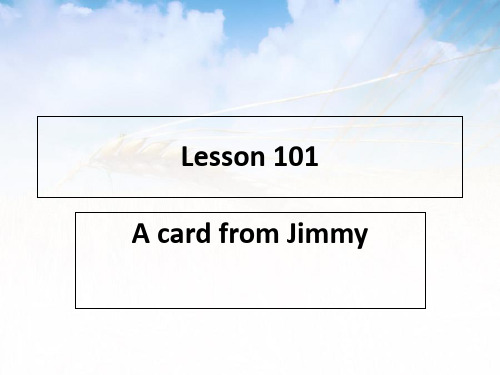
2021/8/7
• He doesn’t say very much, does he?
• 反意疑问句
• 由两部分组成,前面是一个陈述句,后面 是一个简略问句,中间用逗号隔开,反意 疑问句可以用来确认自己的判断,还可以 用来表示惊讶,愤怒等感情
• 如果前一部分陈述句是肯定形式,简略问 句就要用否定形式
• hostel /'hɒstl/
n. 招待所,旅馆
• association /əˌsəʊʃi'eIʃn/
n. 协会
• soon
adv. 不久
• write(wrote, written) v. 写
大不列颠及北 爱尔兰联合王国 the United Kingdom of Great Britain and Northern Ireland
park, the station)(小地点) • 我们十分钟前到达机场。
• We arrived at the airport the minutes ago.
• 他们刚刚到这个旅馆。
• They have just arrived at the hotel.
Text (2)
"I have just arrived in Scotland and I'm staying at a Youth Hostel."
•
14、 意 志 坚 强 的人 能把世 界放在 手中像 泥块一 样任意 揉捏。 2021年 8月7日 星期六 2021/8/72021/8/72021/8/7
•
15、 最 具 挑 战 性的 挑战莫 过于提 升自我 。。2021年 8月 2021/8/72021/8/72021/8/78/7/2021
• He doesn’t say very much, does he?
• 反意疑问句
• 由两部分组成,前面是一个陈述句,后面 是一个简略问句,中间用逗号隔开,反意 疑问句可以用来确认自己的判断,还可以 用来表示惊讶,愤怒等感情
• 如果前一部分陈述句是肯定形式,简略问 句就要用否定形式
• hostel /'hɒstl/
n. 招待所,旅馆
• association /əˌsəʊʃi'eIʃn/
n. 协会
• soon
adv. 不久
• write(wrote, written) v. 写
大不列颠及北 爱尔兰联合王国 the United Kingdom of Great Britain and Northern Ireland
park, the station)(小地点) • 我们十分钟前到达机场。
• We arrived at the airport the minutes ago.
• 他们刚刚到这个旅馆。
• They have just arrived at the hotel.
Text (2)
"I have just arrived in Scotland and I'm staying at a Youth Hostel."
•
14、 意 志 坚 强 的人 能把世 界放在 手中像 泥块一 样任意 揉捏。 2021年 8月7日 星期六 2021/8/72021/8/72021/8/7
•
15、 最 具 挑 战 性的 挑战莫 过于提 升自我 。。2021年 8月 2021/8/72021/8/72021/8/78/7/2021
新概念英语第一册 Lesson101-102 (共20张PPT)

肯定回答: Yes, he can. 不,他会。 否定回答: No, he can’t. 是,他不会。
注意: 没有Yes, he can’t./ No, he can.这种回答哦!
回答为肯定→Yes, +肯定回答. 回答为否定→No, +否定回答.
试一试:
( D) 1. His sister had a bad cough, _________ she?
=> 简略问句的主语要用___代_词____。如:
e.g. John has gone to Beijing, hasn’t he? 他去北京了,不是吗? You don’t like cats, do you? 你不喜欢猫,是吗?
需注意:当反意疑问句前半句为否定句时,回答要根 据实际情况作答。 e.g. Jimmy can’t speak English, can he? 吉米不会说 英语,对吗?
__S_t_a_y _at_h_o_m_e_t_h_es_e_d_a_ys_______.
2. You’d better go to school on foot. __G_o__to_s_c_ho_o_l _on__fo_o_t ___________.
He says he’s just arrived in Scotland. He says he’s staying at a Youth Hostel. You know he’s a member of the Y.H.A.
Role Play
课文详解
(1) Read Jimmy’s card to me please, Penny. 结构:祈使句 常用表达:read sth. to sb. 意为
给“_某_人_读__…__________” 试一试:请把下列句子改为祈使句 1. You must stay at home these days.
注意: 没有Yes, he can’t./ No, he can.这种回答哦!
回答为肯定→Yes, +肯定回答. 回答为否定→No, +否定回答.
试一试:
( D) 1. His sister had a bad cough, _________ she?
=> 简略问句的主语要用___代_词____。如:
e.g. John has gone to Beijing, hasn’t he? 他去北京了,不是吗? You don’t like cats, do you? 你不喜欢猫,是吗?
需注意:当反意疑问句前半句为否定句时,回答要根 据实际情况作答。 e.g. Jimmy can’t speak English, can he? 吉米不会说 英语,对吗?
__S_t_a_y _at_h_o_m_e_t_h_es_e_d_a_ys_______.
2. You’d better go to school on foot. __G_o__to_s_c_ho_o_l _on__fo_o_t ___________.
He says he’s just arrived in Scotland. He says he’s staying at a Youth Hostel. You know he’s a member of the Y.H.A.
Role Play
课文详解
(1) Read Jimmy’s card to me please, Penny. 结构:祈使句 常用表达:read sth. to sb. 意为
给“_某_人_读__…__________” 试一试:请把下列句子改为祈使句 1. You must stay at home these days.
新概念英语第一册第101-102课课件
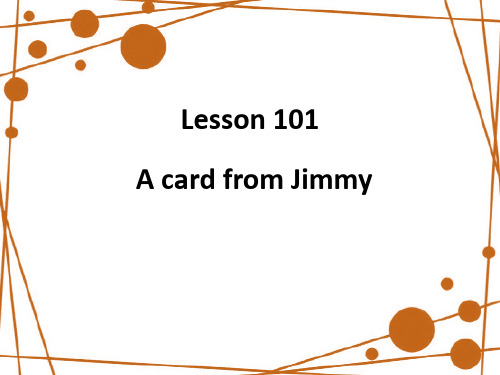
2、‘I have just arrived in Scotland and I’m staying at a Youth Hostel.’
• • • • • • • • • • • just 1、刚刚(完成时态) 她刚刚把钥匙给我。 He has just given the key to me. 他刚刚去图书馆。 She has just gone to the library. 2、正要…,刚要… (进行时态) 他们刚要作弊, 老 师过来了。 They were just cheating. The teacher came here. 他正要离开,他的父母打电话了。 He was just leaving. His parents called.
课文讲解
1、Read Jimmy’s card to me please, Penny. • read sth to sb 把…读给…听 • read sb sth • 读这份报纸给我听。 • Read the newspaper to me. • 你能给我读一下这封信吗? • Can you read the letter to me?
She lost her youth. 她青春不再
She kept her youth. 她青春依旧
★hostel n. 招待所,旅馆(简易的)
• hotel:宾馆,设施比较好的旅店 • inn:(尤指乡村或公路边的)旅馆,小客栈 • motel:汽车旅馆
• association n. 协会 • 我父亲是牙医协会的会长。 • My father was the president of the dental association. • 在组织或者机构前要加定冠词the • the United Nations • the International Olympic Committee
新概念英语第一册101-102课课件

• • • • • • • • •
What else does he say? 你还想要其它什么东西? What else do you want? 其它什么时间我们再见面呢? When else can we meet again? 你还去过其它什么地方? Where else have you been? 还有谁能做这件事? Who else can do it?
• Read Jimmy’s card to me please, Penny. • read sth to sb 把…读给…听 • read sb sth • 读这份报纸给我听。 • Read the newspaper to me. • 你能给我读一下这封信吗? • Can you read the letter to me?
He lost his youth. 他青春不再
He kept his youth. 他青春依旧
3. association n. 协会
• 我父亲是牙医协会的会长。 • My father was the president of the dental association. • 在组织或者机构前要加定冠词the • the International Olympic Committee
单词学习
• • • • • • • Scotland n. 苏格兰(英国) card n. 明信片 youth n. 青年 hostel n. 招待所,旅馆 association n. 协会 soon adv. 不久 write(wrote, written) v. 写
Listen and answer questions:
Penny is reading Jimmy’s card.
新概念英语第一册101-102课课件
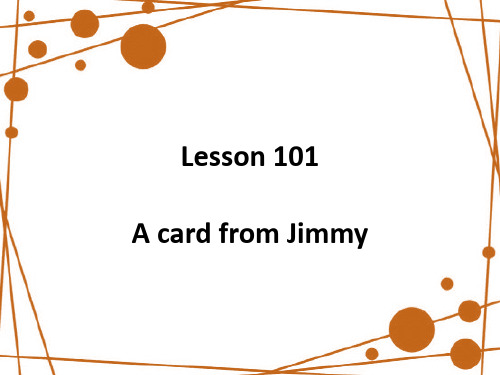
• • • • • • • •
arrive in + 城市 国名(大地点) 城市/ 国名(大地点) 她昨天到了马德里。 她昨天到了马德里。 She arrived in Madrid yesterday. arrive at +公共场所地点名称 公共场所地点名称(airport, 公共场所地点名称 park, the station)(小地点) (小地点) 我们十分钟前到达机场。 我们十分钟前到达机场。 We arrived at the airport the minutes ago. 他们刚刚到这个旅馆。 他们刚刚到这个旅馆。 They have just arrived at the hotel.
直接引语和间接引语
• 直接引语就是直接引用说话人原来所说的 而间接引语就是原话的转述。 话,而间接引语就是原话的转述。 • 直接引语放在引号里,间接引语是把说话 直接引语放在引号里, 人的原话变成宾语从句。 人的原话变成宾语从句。 • 直接引语变间接引语须在人称,时态及地 直接引语变间接引语须在人称, 点状语等方面作相应的变化。 点状语等方面作相应的变化。
• ‘I have just arrived in Scotland and I’m staying at a Youth Hostel.’ • just • 1、刚刚(完成时态) 、刚刚(完成时态) • 她刚刚把钥匙给我。 她刚刚把钥匙给我。 • He has just given the key to me. • 他刚刚去图书馆。 他刚刚去图书馆。 • She has just gone to the library. • 2、正要 刚要 (进行时态 刚要… 进行时态) 、正要…,刚要 进行时态 • 他们刚要作弊, 老 师过来了。 他们刚要作弊, 师过来了。 • They were just cheating. The teacher came here. • 他正要离开,他的父母打电话了。 他正要离开,他的父母打电话了。 • He was just leaving. His parents called.
新概念英语第一册101-102课PPT

Lesson 102 He said he …
She says she …
They say they … 1 T: Look at number 3. I am cold. What's that? S: She says she is cold. 2 T: Number 5. I have a cold. What's that? S: He says he has a cold.
Lesson 102 A 1 She says she has shut the door. 2 He says he has put on his coat. 3 He says he has read this magazine. 4 They say they have spoken to the boss. 5 They say the sun has risen.
Grammar in use: 直接引语和间接引语
1 .直接引语就是直接引用说话人原来所说的话; 间接引语就是原话的转述。直接引语放在引号里, 间接引语是把说话人的原话变成宾语从句。 2 .间接引语中,宾语从句中的动词与主句中的主 要动词在时态上必须保持一致。一般来说,主要 动词用现在时,间接引语中可用现在时(包括一 般现在时、现在进行时、现在完成时)和将来时。 如:
Asking questions: Ake me if…?
1 T: Jimmy has just arrived in Scotland. S: Has Jimmy just arrived in Scotland? T: Where ⋯ ? S: Where has Jimmy just arrived? 2 T: Ask me if he's staying at a Youth Hostel. S: Is he staying at a Youth Hostel? T: Where ⋯ ? S: Where is he staying?
新概念英语第一册L101-102(课堂PPT)
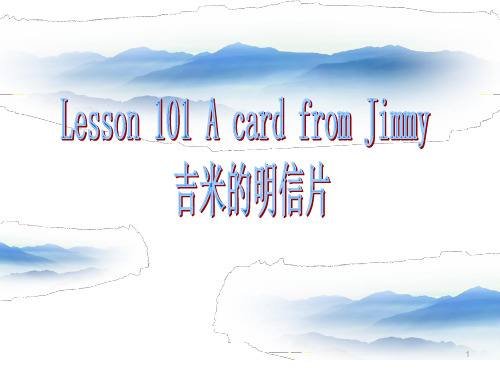
13
Language points
1 . Read Jimmy’s card to me please, Penny.
read sth to sb read sb sth
读这份报纸给我听。
Read the newspaper to me.
你能给我读一下这封信吗?
Can you read the letter to me?
4. The teacher said, “The sun rises in the east and goes down in the west.” The teacher said that the sun ______ in the east and ______ down in the west.
student hostel 学生宿舍
他说他正待在青年旅社。 He says he’s staying at a Youth Hostel .
8
association n. 协会
我爸爸是牙医协会的会长。
My father was the president of the dental association.
22
一.将直接引语变间接引语
1.The girl said, “I like English very much.”
The girl said that she liked English very much.
2.He said, “You can sit here, Jim.”
He told Jim that he could sit there.
Mr. Black said:" I am sorry.” Mr., Black said that he was sorry.
Language points
1 . Read Jimmy’s card to me please, Penny.
read sth to sb read sb sth
读这份报纸给我听。
Read the newspaper to me.
你能给我读一下这封信吗?
Can you read the letter to me?
4. The teacher said, “The sun rises in the east and goes down in the west.” The teacher said that the sun ______ in the east and ______ down in the west.
student hostel 学生宿舍
他说他正待在青年旅社。 He says he’s staying at a Youth Hostel .
8
association n. 协会
我爸爸是牙医协会的会长。
My father was the president of the dental association.
22
一.将直接引语变间接引语
1.The girl said, “I like English very much.”
The girl said that she liked English very much.
2.He said, “You can sit here, Jim.”
He told Jim that he could sit there.
Mr. Black said:" I am sorry.” Mr., Black said that he was sorry.
新概念英语第一册第101-102课省公开课金奖全国赛课一等奖微课获奖PPT课件
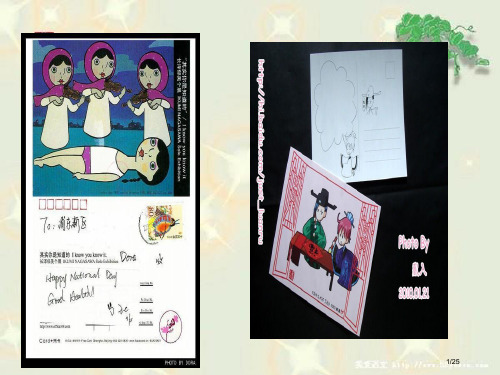
他说他住在一家青年招待所。 你知道,他是“青招协”一个组员 祖母:什么? 彭妮:“青招协”,妈妈。青年招待所协会。 祖母:他还说了些什么? 彭妮:“我很快会写信。
祝你们大家身体都好。” 祖母:什么?彭妮,大声一点。
我可听不见你念。 彭妮:他说他很快会写信。
他祝我们大家身体好。“谨此问候,吉米。” 祖母:就这些吗?他没写许多,是吗? 彭妮:在明信片上他写不了很多,妈妈。
• 1. 通知自己旅游情况。 • 2. 通知他人自己新住址。 • 3. 寄送节日祝福。 • 4. 传达想念。 • 5. 问询对方近况。 • 6. 通知一些必要信息。
• 在书写明信片之前,我们要确定这张明信片主要目标是 什么,确定以后,就能够开始写了。 因为明信片并不是 非常正式文字载体,我们在书写时候能够随意一些,但还 是要注意以下几点:
What’s the matter with him/them? He says that he has a cold.
a headache
a toothache
14/25
a haricut an X- ray
What does he want/need? He says that he needs a haircut
• G: What? Speak up. Penny. I'm afraid I can't hear you
• P: He says he'll write a letter soon.
• He hopes we are all well. 'Love, Jimmy.'
• G: Is that all? He doesn't say very much, does he?
祝你们大家身体都好。” 祖母:什么?彭妮,大声一点。
我可听不见你念。 彭妮:他说他很快会写信。
他祝我们大家身体好。“谨此问候,吉米。” 祖母:就这些吗?他没写许多,是吗? 彭妮:在明信片上他写不了很多,妈妈。
• 1. 通知自己旅游情况。 • 2. 通知他人自己新住址。 • 3. 寄送节日祝福。 • 4. 传达想念。 • 5. 问询对方近况。 • 6. 通知一些必要信息。
• 在书写明信片之前,我们要确定这张明信片主要目标是 什么,确定以后,就能够开始写了。 因为明信片并不是 非常正式文字载体,我们在书写时候能够随意一些,但还 是要注意以下几点:
What’s the matter with him/them? He says that he has a cold.
a headache
a toothache
14/25
a haricut an X- ray
What does he want/need? He says that he needs a haircut
• G: What? Speak up. Penny. I'm afraid I can't hear you
• P: He says he'll write a letter soon.
• He hopes we are all well. 'Love, Jimmy.'
• G: Is that all? He doesn't say very much, does he?
新概念英语第一册101-102课课件

课文讲解
• • • • • • • Read Jimmy’s card to me please, Penny. read sth to sb 把…读给…听 read sb sth 读这份报纸给我听。 Read the newspaper to me. 你能给我读一下这封信吗? Can you read the letter to me?
直接引语和间接引语
• 直接引语就是直接引用说话人原来所说的 话,而间接引语就是原话的转述。
• 直接引语放在引号里,间接引语是把说话 人的原话变成宾语从句。 • 直接引语变间接引语须在人称,时态及地 点状语等方面作相应的变化。
1.如果直接引语为陈述句,变为间接引语时 常用从属连词that引导(口语中可省略), 引述动常常用say, tell等。同时,概据主 语的要求,间接引语须在人称,时态及其 它方面作相应的变化。 • She said to me,“I have left my book in your room.” • She told me that she had left her book in my room.
• 如果直接引语为祈使句,变为间接引语时 多用“名词(代词)+不定式”结构。 • 1)引述表示命令的祈使句,常用动词order, tell, warn; • 2)引述表示请求的祈使句,常用动词ask, beg; • 3)引述表示建议、劝告的祈使句,常用动词 advise等。 • The boss said,“Please come here again tomorrow.” • --The boss asked me to go there again the next day.
• • • • • •
• • • • •
新概念英语第一册Lesson101-102(共12张PPT)
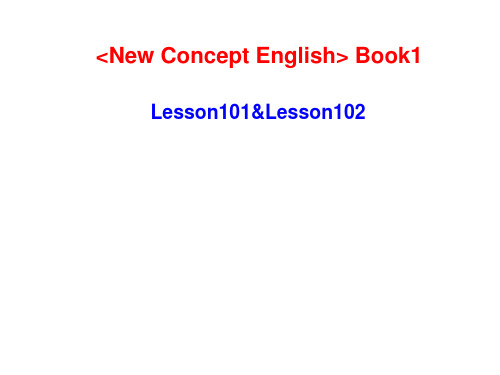
I can't come to the party on Friday.
He says he can't come to the party on Friday.
My parents are very well.
He says his parents are very well.
John has been to New York.
you your yours yourself yourselves 二五变
主对主,宾对宾,物主对物主,反身对反身。 一随主 二随宾 第三人称不更新 一十变 二五变 三不变
I‘m going to learn Chinese.
He says he is going to learn Chinese.
Youth Hostel. You know he's a member of the Y.H.A. G: The what? P: The Y.H.A., Mum. The Youth Hostels Association. G: What else does he say? P: 'I'll write a letter soon. I hope you are all well.' G: What? Speak up,Penny. I'm afraid I can't hear you. P: He says he'll write a letter soon. He hopes we are all well.
1.read ...to…给…读 read sb sth
Read Jimmy's card to me.=Read me Jimmy's card.
新概念英语NCE1_Lesson101-102(共45页)课件

• He hopes we are all well. • He hopes that: ‘You are all well.’ • ‘Love, Jimmy.’ • ‘Love xxx, Jimmy.’
• Is that all?
• What else do you want?
• Hotel is bigger better and more beautiful than hostel.
• Hotel is high level. • Youth Hostel 青年招待所 • 我现在住在一个青年招待所。
• I am staying at a Youth Hostel. • 我认为这是苏格兰最好的青年招待所了。
The Youth Hostels Association.
• He says he’s just arrived in Scotland. (间接引语) • He says: ‘I’ve just arrived in Scotland.’(直接
引语) • He says he’s staying at a Youth Hostel.
Answer some questions:
• What does he say? • Is he a member of the Y.H.A.? • What is the Y.H.A.?
G: What else does he say? P: ‘I’ll write a letter soon. I hope you are all well.’
• 直接引语:直接引用别人的话,把它放在单引 号里。
• 间接引语:转述别人的话,人称发生改变。
• 直接引语变间接引语,如果主句是一般现在时, 从句人称发生改变,时态不变。并去掉单引号。
• Is that all?
• What else do you want?
• Hotel is bigger better and more beautiful than hostel.
• Hotel is high level. • Youth Hostel 青年招待所 • 我现在住在一个青年招待所。
• I am staying at a Youth Hostel. • 我认为这是苏格兰最好的青年招待所了。
The Youth Hostels Association.
• He says he’s just arrived in Scotland. (间接引语) • He says: ‘I’ve just arrived in Scotland.’(直接
引语) • He says he’s staying at a Youth Hostel.
Answer some questions:
• What does he say? • Is he a member of the Y.H.A.? • What is the Y.H.A.?
G: What else does he say? P: ‘I’ll write a letter soon. I hope you are all well.’
• 直接引语:直接引用别人的话,把它放在单引 号里。
• 间接引语:转述别人的话,人称发生改变。
• 直接引语变间接引语,如果主句是一般现在时, 从句人称发生改变,时态不变。并去掉单引号。
新概念第一册101-102课件
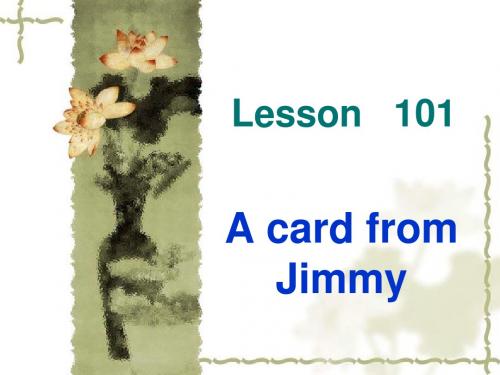
1. a fine day. Let’s go fishing, D ? A. won‘t we B. will we C. don’t we D. shall we A 2.Be sure to write to us, ___? A. will you B. aren't you C. can you D. mustn't you 3. --You haven't been to Beijing, have you? D --_____.How I wish to go there! A. Yes, I have B. Yes, I haven't C. No, I have D. No, I haven't
2.‘I
have just arrived in Scotland and I’m staying at a Youth Hostel.’
just 1、刚刚(完成时态) eg: She has just gone to the library.
2、正要…,刚要… (进行时态) eg: He was just leaving. His parents called.
回答反意疑问句要根据实际情况而定。
eg:实际情况:He is an engineer.
(1) He is an engineer, isn’t he? 他是一个工程师,不是吗? (2)He isn’t an engineer, is he? 他不是一个工程师,是吗? --Yes, he is.(不,他是。)
card n. 明信片,卡片
Christmas card 圣诞卡 ID card 身份证 business card 名片 post card 明信片 credit card 信用卡 play card 扑克
成人版新概念英语1lesson101-102课文语法精美图文ppt初中英语学习
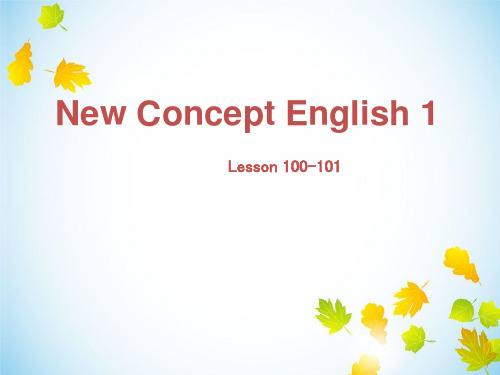
He says (that) he hopes we are all well.
人称 人称 时态
人称
The girl says: “I have finished my homework
The girl says (that) she has finished her
3、n. 后面,后部
There are two students at the back of the
classroom.教室的后面有2名学生。 at the back of 在…后面…
4、adv.向后、往后、回到原处
I turn back to my bed.
come back to… go back to…
主句一般过去时,从句只能用相应的过去时态 I thought (that )he watched the match.
如宾语从句所陈述的内容是客观真理,客观事实, 自然现象或定理等,则用一般现在时
The teacher said (that) the earth goes around the sun.
Turn off the TV at once!
I think we should leave at once.
sure adj 一定的,确信的
be sure of sth I am sure of my answer.
be sure that+句子
She is sure that she lost her purse.
直接引语和间接引语
直接引语就是直接引用说话人原来所说的 话,而间接引语就是原话的转述。
直接引语放在引号里,间接引语是把说话 人的原话变成宾语从句。变化。
人称和时态的变化
- 1、下载文档前请自行甄别文档内容的完整性,平台不提供额外的编辑、内容补充、找答案等附加服务。
- 2、"仅部分预览"的文档,不可在线预览部分如存在完整性等问题,可反馈申请退款(可完整预览的文档不适用该条件!)。
- 3、如文档侵犯您的权益,请联系客服反馈,我们会尽快为您处理(人工客服工作时间:9:00-18:30)。
• Where did Jimmy stay in Scotland? • Which association does Jimmy belong to • Did Jimmy say much? Why?
else adv.其他,另外
1. else 是个副词,与不定代词或副词(以-one,body,-thing,-where结尾的词)连用,表示“另外” 、“其它”的意思,用于这些词后面。 2e.ge:lWseo还ul可d y用ou在li疑ke问so代me词th或ing副e词lse(to如dr:inwk?h你o 还要 喝,wh点a别t ,w的h什er么e等吗)?后面表示强调。 公e议3“egg.:?园 e要:RWlWsWu去不ehnhaeo还t,了然oweerll常,e”sseeenls用tdw其。eotiwo于le它lsetg'hh固lo什leebt定sop么eaatylh结ars地etk?em构他方a. ne快还oed也tr跑i说n没ego,l了ws?去e不h些还,e。然意什有re我为么谁e们l?“要se就.去否我迟参则到们加”了到会、。
年轻时,我的梦想是成为一名科学家。
The fight was started by a gang of youths. 这次斗殴是由一伙小青年引挑起的。
hotel
hostel
a hostel for the homeless
无家可归者的收容所
association n.协会,联盟
CFA=China Football Association
• 结构: 陈述句 + 简略疑问句
• 使用规则: A. 陈述部分与疑问部分的动词时态和动词性 质应保持一致 ; B. 陈述部分与疑问部分 “肯定” 和”否定” 形式彼此相反 。
He likes books, doesn't he? The dinner isn't ready, is it?
• The doctor comes at once,doesn't he? • They stay in a Youth Hostel, don't they? • Jimmy didn't write much, did he ? • Jimmy has arrived in Scotland,hasn't he ? • He will write a letter soon, won't he ?
由直接引语转变为间接引语,有时会引时 态的变化, 注意以下几个方面:
从句动词时态不变 She often says that all men and women are equal under the law.
一般现在时 “I know it,” he said.
一般过去时 He said that he knew it.
现在完成时 “I have seen her before,” said he.
过去完成时 He said he had seen her before.
I hope you are all well.
I hope (that) you are all well.
宾语从句的关系连词that 常可以省略。
I believe (that) the heart does go on. ---- from Titanic
反义疑问句
• 表示询问、惊讶、愤怒等感情。
Direct speech
& indirect speech
直接引语 和间接引语
1)人称的变化 一随主,二随宾,三不变
一 随 主
引号内的第一人 称变间引后与主 She said,“ I 句主语的人称保 like tennis.”
持一致
She said that she liked tennis
二 随
现在进行时 “I'm making coffee for you all,” she said.
过去进行时 She said she was making coffee for us all.
现在完成时 “I have seen her before,” said he.
过去完成时 He said he had seen her before.
Lesson 101
A card from Jimmy
card n.卡,纸牌; 明信片
打牌
play cards
postcard n. 明信片
send sb. a postcard 寄给某人明信
New words
Scotland n. 苏格兰
youth n.
In my youth, my dream is to be a scientist.
引号内的第二人 He said to Lily, 称变间引后与主 “ you must get
宾 句宾语的人称保 up early”
持一致
He told Lily that she must get up early
三 引号内的第三人 She said to me ,
不 称在变间引后去人“ they want to
变 称不变
help him”
She told me that they wanted help him
引述别人的话语一般采用两种方式:
一.原封不动地引用原话,把它放在括 号内,这叫直接引语 (Direct speech);
二. 用自己的话加以转述, 这叫间接引 语 (Indirect speech).
中国足球协会
NBA= China Basketball Association
中国篮球协会
write v.写,写字;写作 write -- wrote-- written
He wrote some very famous books.
他写了几本很有名的书。
Answer the questions
Do what I say ,or else ! 照我的话去做,否则后果自负。
speak up
up adv.向上, 起来, 上升, 往上
stand up
站起来
turn up the TV 调大视音量
get up
起床
put up your hands 举起手
look up at the sky 仰视天空
else adv.其他,另外
1. else 是个副词,与不定代词或副词(以-one,body,-thing,-where结尾的词)连用,表示“另外” 、“其它”的意思,用于这些词后面。 2e.ge:lWseo还ul可d y用ou在li疑ke问so代me词th或ing副e词lse(to如dr:inwk?h你o 还要 喝,wh点a别t ,w的h什er么e等吗)?后面表示强调。 公e议3“egg.:?园 e要:RWlWsWu去不ehnhaeo还t,了然oweerll常,e”sseeenls用tdw其。eotiwo于le它lsetg'hh固lo什leebt定sop么eaatylh结ars地etk?em构他方a. ne快还oed也tr跑i说n没ego,l了ws?去e不h些还,e。然意什有re我为么谁e们l?“要se就.去否我迟参则到们加”了到会、。
年轻时,我的梦想是成为一名科学家。
The fight was started by a gang of youths. 这次斗殴是由一伙小青年引挑起的。
hotel
hostel
a hostel for the homeless
无家可归者的收容所
association n.协会,联盟
CFA=China Football Association
• 结构: 陈述句 + 简略疑问句
• 使用规则: A. 陈述部分与疑问部分的动词时态和动词性 质应保持一致 ; B. 陈述部分与疑问部分 “肯定” 和”否定” 形式彼此相反 。
He likes books, doesn't he? The dinner isn't ready, is it?
• The doctor comes at once,doesn't he? • They stay in a Youth Hostel, don't they? • Jimmy didn't write much, did he ? • Jimmy has arrived in Scotland,hasn't he ? • He will write a letter soon, won't he ?
由直接引语转变为间接引语,有时会引时 态的变化, 注意以下几个方面:
从句动词时态不变 She often says that all men and women are equal under the law.
一般现在时 “I know it,” he said.
一般过去时 He said that he knew it.
现在完成时 “I have seen her before,” said he.
过去完成时 He said he had seen her before.
I hope you are all well.
I hope (that) you are all well.
宾语从句的关系连词that 常可以省略。
I believe (that) the heart does go on. ---- from Titanic
反义疑问句
• 表示询问、惊讶、愤怒等感情。
Direct speech
& indirect speech
直接引语 和间接引语
1)人称的变化 一随主,二随宾,三不变
一 随 主
引号内的第一人 称变间引后与主 She said,“ I 句主语的人称保 like tennis.”
持一致
She said that she liked tennis
二 随
现在进行时 “I'm making coffee for you all,” she said.
过去进行时 She said she was making coffee for us all.
现在完成时 “I have seen her before,” said he.
过去完成时 He said he had seen her before.
Lesson 101
A card from Jimmy
card n.卡,纸牌; 明信片
打牌
play cards
postcard n. 明信片
send sb. a postcard 寄给某人明信
New words
Scotland n. 苏格兰
youth n.
In my youth, my dream is to be a scientist.
引号内的第二人 He said to Lily, 称变间引后与主 “ you must get
宾 句宾语的人称保 up early”
持一致
He told Lily that she must get up early
三 引号内的第三人 She said to me ,
不 称在变间引后去人“ they want to
变 称不变
help him”
She told me that they wanted help him
引述别人的话语一般采用两种方式:
一.原封不动地引用原话,把它放在括 号内,这叫直接引语 (Direct speech);
二. 用自己的话加以转述, 这叫间接引 语 (Indirect speech).
中国足球协会
NBA= China Basketball Association
中国篮球协会
write v.写,写字;写作 write -- wrote-- written
He wrote some very famous books.
他写了几本很有名的书。
Answer the questions
Do what I say ,or else ! 照我的话去做,否则后果自负。
speak up
up adv.向上, 起来, 上升, 往上
stand up
站起来
turn up the TV 调大视音量
get up
起床
put up your hands 举起手
look up at the sky 仰视天空
